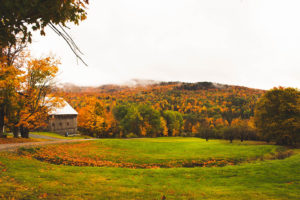Popular Class in Humanism More Accessible Than Ever
 Photo by Aditya Vyas on Unsplash
Photo by Aditya Vyas on Unsplash Since 2009, people have ventured to rural Vermont and lodged in a rustic country inn to not only savor the stunning vistas of Mount Snow and the verdant Green Mountains made famous by freethinking Revolutionary War patriot Ethan Allen, but to engage in a week-long study of humanism. With the recent pandemic, however, the face-to-face sessions of this popular class were put on hold, replaced with a convenient offering via Zoom that was presented in four two-hour evening sessions spread across June. Although the class covered about half the original content, it engaged more students who might not have been able to spend a week away.
The curriculum was originally developed by Carol Wintermute, late dean of the Humanist Institute, (which merged with the American Humanist Association in 2018 to become the current AHA Center for Education) to meet a longstanding need for a deeper understanding of the humanist outlook, its history, and its real-world applications. The class explored humanist ideas, the background of the humanist movement, and current expressions of the philosophy. It also went beyond to discuss how an important and positive ethical outlook can grow out of liberation from traditional faith. Using the tools of critical thinking, science, and aesthetics, it shed light on the important philosophical and social issues of our time, as well as better ways to live our personal lives. All of this continued in the webinar version.
The online sessions featured interactive lectures, visual presentations, and exploratory discussions. In the first Zoom session, students were introduced to the basic ideas central to humanism and the ways it is interpreted and expressed through the various organizations that have come to comprise the humanist movement. Then came the history of humanist thought and its influence across time, covering ancient times through the Renaissance, as well as humanism’s development into a movement in the twentieth century. In response to the latter, one student asked:
Would you say there was a patriarchal culture in early humanism—for instance, that humanism did not escape the mores of the time? How were women welcomed into leadership, authorship?
Yes, the level of patriarchy that dominated society—from ancient times to today—including in academia, the professions, and politics, tainted even the most enlightened thinking. Not only were women often consciously excluded but, even when not, male-dominated environments waxed inhospitable to women’s participation. Beginning in the mid-twentieth century, however, women made their way into organized humanism, not by waiting to be welcomed but by intentionally breaking down the barriers and, once inside, raising consciousness and opening minds. This is how change comes about, fostered by those who most want it because they have the greatest personal stake in it.
The second session zeroed in on humanism’s philosophical foundations: its focus on critical thinking and scientific ways of knowing. Starting from its nontheistic worldview and critique of traditional religion, intellectual tools and methods were introduced for understanding how we come to know things and, thus, how we justify our beliefs and values. In the third session, this grounding was applied to compassionate ethics, beginning with the humanist philosophical foundation for ethics and expanding across the social spectrum to include human rights theory.
Finally, in the fourth and final session, humanism was brought to bear on daily life through an exploration of life’s passages, the arts, and rational living in troubled times. This brought the emotional and affective side of our humanity into play and included the role of community in human wellbeing.
Most of the online students were already humanists, which shifted the focus in the direction of deepening and fine-tuning one’s humanism rather than just understanding what it is. This was not always the case for the Vermont class—promoted by Road Scholar (formerly Elderhostel). These students have included the traditionally religious (even a minister), strong atheists, conservatives, liberals, searchers, seekers, and those just wanting to broaden their knowledge. All have found the experience worthwhile. One student pinpointed some particular features and benefits:
The research—lectures and power points—was very impressive and well done. I am in awe of the amount of time and study and preparation that went into organizing all of this. This is exactly what I want from a Road Scholar program—not mere entertainment and activity but a feast for my mind and a challenge for my intellect.
We look forward to continuing the class for students both new to humanist concepts and those who want to more deeply explore the humanist life stance. It is now anticipated that, with the waning of the pandemic in most of the United States, Road Scholar will sponsor the face-to-face class again in 2022. And, we’ve heard interest in repeating the online version for those unable to travel. We will keep you posted on new developments so that more can enjoy this opportunity to expand their humanist understanding.
